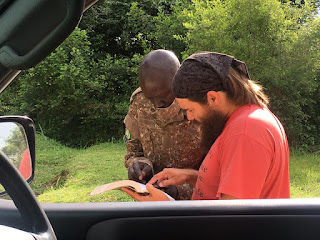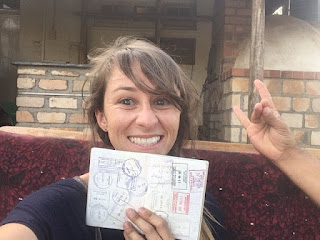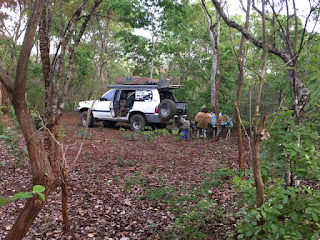Ek en August voel ongelooflik bevoorreg om die afgelope 6 maande die wêreld op 'n manier 'uncropped' te kon ervaar. Sonder filters en sonder dat al die vervelige en frustrerende dele uitgesny is agter 'n rekenaar. Ons neem fotos (soms met 'n instagram filter moet ek bieg), en deel dit met ons familie. Maar dit kan bedrieglik wees. Eintlik, dit IS bedrieglik. Die hoogtepunte is baie minder en baie meer as die fotos. Daar is baie meer dooie dele en uitdagings op so 'n toer as wat mens dink, maar die hoogtepunte oortref ook al die foto-en-tripadvisor-verwagtinge wat mens vooraf kweek. Wanneer kan jy sê jy ken Afrika? Ons kan nie.
Ons het gister een so ongelooflike ervaring gehad toe ons saam met walvishaaie kon snorkel. Daar was twee grotes wat rondom my en August gedraai het, albei naby genoeg dat mens jou hand kon uitsteek en aan hul raak. Dit was een van daardie oomblikke wat die wêreld jou in die maag tref. 'The world opened up before my consiousness'. Of so iets. Ek kan nie aan ander woorde dink om dit te beskryf nie.
Nat en vol adrenalien, terug op die boot, bons ons deur die massiewe deinings soos deur die oerwaters in Genesis, en die boot stop onverwags by nog 'n groot walvishaai. Ons is ontsettend gelukkig om meer as een te sien. Ek is eerste in die water en swem al bo hom, 'n meter of drie ver, en bewonder sy skoonheid en sy majestie. Sewe kleiner haai-visse swem onder hom en daar is stuk of agt lang silwer visse wat aan hom klou. Die sand is helder onder ons. Stadig en stil swem hy, met anderwereldse kalmte onder die skuimende waters. Iets brand op my gesig soos 'n bloublasie en later my enkel, maar ek en die walvishaai is alleen en ek moet by hom bly. Na 'n ewigheid van saam met hom swem in die stadige waters begin hy dieper duik en ek verloor hom. August is meteens langs my. Ydi! Kom terug! Jellievisse! Ek draai om en sien die boot doer ver en dat ek die enigste persoon in die water is. Ons lag. Daar was' 'n reuse skool jellievisse en almal is gesteek en het teruggeklim op die boot. Ek was die engiste een met 'n duikpak.
Pure lewe. Ek reflekteer hoe anders die dag uitgespeel het as om dit op 'n video te sien met David Attenborough. Hoe vreemd is die virtuele metawêreld waarheen sommige ons wil neem? Hoe ge-redigeer en ge-saniteerd en ge-manikuur word ons lewens. Ek klou vas aan die koue sproei van die branders, die sout op jou lippe en die ure se soek voor ons iets op die verlate waters kon vind. Klou vas aan werklikheid soos silwervisse aan 'n walvishaai. George Macdonald of C.S. Lewis sou, dink ek, sê: so groot soos die verskil tussen die werklikheid en die foto, so groot (en baie meer) is die verskil tussen ons lewe op hierdie stukkie aarde en dit waarvoor ons gemaak is. Lees The Great Divorce, dan sal dit sin maak.
Ons toer begin nou tot 'n einde kom en ons het heelwat gemengde gevoelens. Vanaf Tofo beplan ons nog een of twee stoppe langs die kus, en dan SA rondom die einde van die maand. Ook: donderstorms in Mosambiek is iets om te beleef. Ons het die eerste reen-blits-donderdreunende-storm van die seisoen ervaar in Tete en toe ook in Tofo. Dis iets groots. Ook nie iets wat op 'n skerm kan ervaar word nie. Veral nie as die krag af is nie :)
Groete en jammer vir al die ramblings,
Y (en August - wat nogsteeds rooi is van al die jellievisse)

















